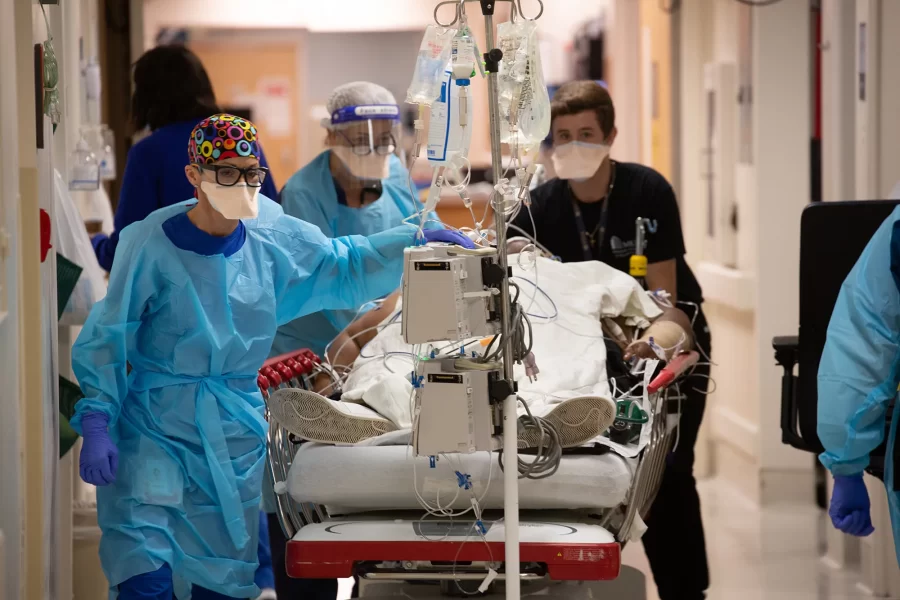Hospital Staff Shortage: Who will attend to all the patients?
In the wake of the omicron outbreak, hospitals are dealing with stressed and overworked staff. They ran out of PPE supplies first, then ventilators, and now our most needed heroes.
The primary issue for health care executives in this wave of the pandemic isn’t personal protective equipment, intensive care space, or ventilators, as the highly transmittable omicron strain of COVID-19 drives a rapid surge in hospitalizations in New Jersey. It has to do with staff.
Hospital staff, like the general population, are being infected with COVID in record numbers. However, when they become ill, hospitals are unable to provide care for the rest of us.
Since increased testing over the holidays is identifying more cases and the omicron variant continues to spread, New Jersey’s daily COVID case number touched a high of more than 20,000 cases. Even in the last 30 days, in the United States, more than 64 million cases have been reported, with over 844,000 deaths, according to CCD.
On Dec. 23, a new high was reached for hospital worker infections: 437. Not even a week later, a new record of 586 was set. That surpasses the previous high of 162 set last winter, December 2020.
By the end of the month, CDC estimates that over 54,000 individuals would be admitted to hospitals, due to the omnicron variant rapid transmission. As a consequence for the MIA staff, health-care institutions across the country are postponing elective treatments, declining requests for emergency medical services patients, and dealing with ill staff. Several states have sent the National Guard to assist overburdened hospitals, generally by doing routine administrative duties such as assisting with food deliveries or cleaning dirty rooms.
The highest shortages occurred in West Virginia, Vermont, Rhode Island, Wyoming, California, and last but not least, New Mexico, with a whopping 50% of hospitals reporting staff shortage.
The real question is not what caused the frequent staff shortages, but who will take care of the whole world once they are gone?
Fortunately, in Hunterdon County Hospitals, all staff must wear surgical masks, and employees dealing directly with COVID patients or during operations must wear specially fitted N95 masks such as protective gear such as a special gown, gloves, and face shield/goggles. “The majority of our employees are vaccinated and for those that are not, mandatory COVID testing is required weekly,” reassures Kathleen Seelig, Corporate Director of Public Relations and Marketing at Hunterdon Healthcare System in a Lamp interview.
Upon the question if there was a hospital staff shortage at Hunterdon Medical Center, Seelig replied with, “All hospitals and healthcare systems are required to maintain best practice staffing levels to ensure patient safety and quality standards. Healthcare workers who provide acute care for patients are cross-trained in multiple areas, which enables them to move between departments and assist with patients when necessary. All healthcare organizations have documented protocols for crisis situations, like a staffing shortage.”
In accordance with the state Department of Health’s instructions, “these protocols direct them to temporarily suspend non-emergent services, including elective surgeries and/or outpatient diagnostic procedures, if and when necessary to redeploy clinical staff to assist in other critical patient care areas where help is needed, ” Seelig states in the interview. Hunterdon Healthcare has employees caring for COVID patients every day, being close to these virus hotspots, risking their lives every second.
“It is like being on a battlefield or a movie. The disease is novel, it can cause serious illness and death and there are no proven therapies,” describes Shehzana Ashraf, MD, Medical Director at Hunterdon Healthcare, on what it is like combating the disease on the frontlines. “There have been many heart-wrenching moments while treating patients. It’s also sad when we need to have difficult conversations with the families on the phone and not face to face, holding their hands and giving them hugs. Nevertheless, we are trying our best to stay strong and fight the enemy until the bitter end.” Hunterdon Healthcare is currently in the RED Status, meaning that visitations are prohibited.
The COVID-19 is age agnostic. The hospital regularly sees and cares for COVID+ patients of all ages. That being said, according to Seelig, the majority of the currently hospitalized COVID+ patients are over the age of 25 and predominantly unvaccinated. To find the number of reported cases in the hospital, you can visit the Hunterdon Healthcare facebook page and see daily updates.
While doctors and nurses are saving lives, we also have to say thank you to all the supporting staff and housekeeping in the hospital because they are making a difference and without support, the housekeeping hospital wouldn’t be disinfected and clean so they need to limit exposure to coronavirus.
In other places around New Jersey, the cry for help is answered by the military. At the University Hospital in Newark (New Jersey’s only public acute-care hospital, one of six across the country), a military medical team will be sent to help the over 700 sick staff with the coronavirus– more than any other hospital in New Jersey.
With the highly transmissible variant affecting our most critical frontliners in this ongoing battle, there are a number of things Central students can do, despite unpredicatmented future at stake.
Seelig’s philosophy is simple: “I think our workers would appreciate everyone following the COVID safety guidelines listed above to help contain the spread of the virus and protect our community. In addition, our staff always appreciate supportive notes from our community.”





